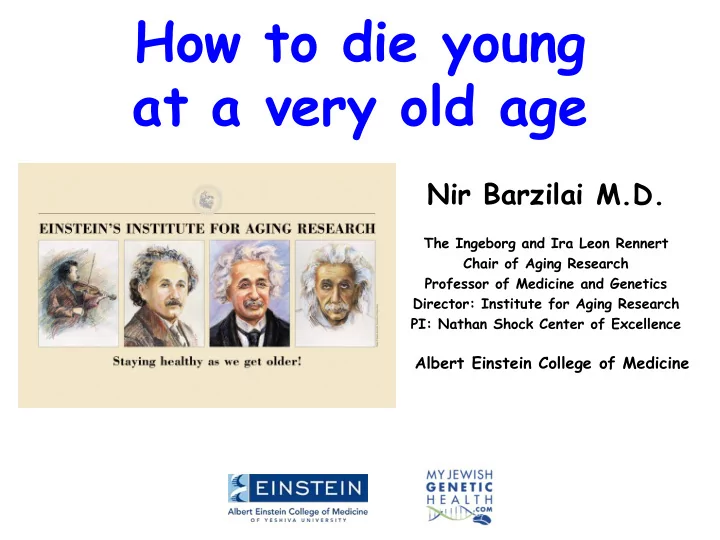

How to die young at a very old age Nir Barzilai M.D. The Ingeborg and Ira Leon Rennert Chair of Aging Research Professor of Medicine and Genetics Director: Institute for Aging Research PI: Nathan Shock Center of Excellence Albert Einstein College of Medicine
Aging: Environment or genes?
Longevity in the Torah • Methuselah 969 years • Noah 950 years • Abraham 175 years • Isaac 180 years • Jacob 140 years • Joseph 110 years • Moses 120 years
Aging is the major risk factor for death from ALL chronic diseases
Do we, humans, age at different rates?
What is the evidence for success in the goal of delaying aging? AGING GENOME Longevity AGING CELLS AGING METABOLISM Healthy life-span has been extended in • numerous models. Relevant drugs have been used in • humans.
Genetics of human longevity Can a study design depict the challenges of genetics of aging? • Only ~1/10,000 individuals is 100 years old (n~600; 95-112) • There is a remarkable family history of exceptional longevity in parents, siblings and offspring of “ centenarians ” • Hypothesis : 1) Perfect genome
Medical cost ($) during the last 2 years of life 92 24,000 25,000 20,000 15,000 8,000 10,000 5,000 0 60-70 Yo >100 Yo
Centenarians interaction with the environment (n=477, 75% females) Centenarians ‘ Environmental ’ Men Women risk • Over weight/obese: 48% 44% • Smoking: 60% 30% • Alcohol (daily): 24% 12% • Physical activity : 43% 47% ( Moderate: regular walking, bicycling, housework) • Vegetarians: 2.6% Swapnil Rajpathak and Jill Crandall J Am Geriatr Soc. 2011 Aug 3
Genetics of human longevity Can a study design depict the challenges of genetics of aging? • Only ~1/10,000 individuals is 100 years old (n~600; 95-112) • There is a remarkable family history of exceptional longevity in parents, siblings and offspring of “ centenarians ” • Hypothesis : 1) Perfect genome/environment 2) Protective genes to assure human ’ s longevity
A major barrier to conducting a study of centenarians Is there an appropriate control group? • The cohort assembled to date ( “ LonGenity ” ) is unique: • Offspring of centenarians are enriched with longevity phenotypes and genotypes • Study of offspring permits comparisons with age- and gender-matched controls. • All Ashkenazi Jews
Offspring are less likely to have age- related diseases than controls 40 Proband P 35 ** Prevalence in population O Offspring C Control 30 25 20 15 ** p<0.01 10 ** ** 5 ** 0 HTN (%) DM (%) MI (%) Stroke (%) JAGS 2004; 52:274
Diminished GH/IGF-1 action improves longevity across nature Small dogs live longer Ghr -/- , lit/lit, GHA, Wt, bGH than large dogs Longer lifespan in daf-2 mutants Longevity IGF-1R +/- females, but not males, live longer Ponies live longer than thoroughbreds
CETP V genotype and cognitive function: High HDL cholesterol 1.0 1.0 0.8 0.8 Alzheimer's disease free Survival Dementia-free Survival 0.6 0.6 0.4 0.4 Isoleucine homozygotes Isoleucine homozygotes Valine heterozygotes Valine heterozygotes Valine homozygotes Valine homozygotes 0.2 0.2 Alzheimer ’ s-free survival Dementia-Free survival 0.0 0.0 75 80 85 90 95 100 75 80 85 90 95 100 Age in years Age in years Sanders et al JAMA. 2010 Jan 13;303(2):150-8.
How does the environment effects the genome?
Longevity in the Torah • Methuselah 969 years • Noah 950 years Stress • Abraham 175 years Caloric restricton • Isaac 180 years • Jacob 140 years • Joseph 110 years • Moses 120 years
Exceptional Longevity is Associated with Decreased Reproduction Number of Children People with exceptional longevity Controls
1) If you prevent aging you may prevent its diseases 2) Research to the biology and genetics of aging is bearing fruits (or medications…) 3) Healthy aging is not going to destroy us ($) Your genetic make up is modifiable: Food, drug development, prayers etc…
How to die young at a very old age Nir Barzilai M.D. The Ingeborg and Ira Leon Rennert Chair of Aging Research Professor of Medicine and Genetics Director: Institute for Aging Research PI: Nathan Shock Center of Excellence Albert Einstein College of Medicine
Funding for this series is provided in part by: Program for Jewish Genetic Health UJA-Federation of New York A generous grant in honor of Beatrice Milberg
Recommend
More recommend